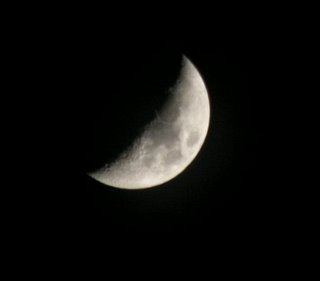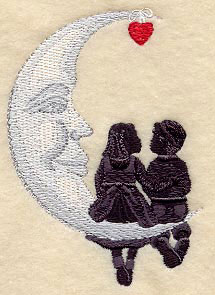
In Apr this year, I composed a blog entry (the
17th) on prayer. Back then, I talked about praying in humility and focusing on what God wants instead of what we want. Interestingly, my church also talked about prayer over the last 3 weeks. Below are excerpts (almost 100 percent verbatim from the speakers themselves) of 2 of the sermons, which present different perspectives on what prayer is about. There are endless publications on this topic, and there will probably be similar publications
ad infinitum into the future, but I think nobody in this world can say authoritatively what prayer is (not even me - deepest apologies if I ever gave such an impression). So, whatever you read, please read with a discerning mind.
Prayer (to me) is about an individual's communication with a supernatural being. In my faith, this being is called God. Each individual has every
right to say what he/she wants to say to his/her God. But I think (and this is where it gets personal) that there are standards of effective communication with any being, including one with a supernatural being. And since we are communicating with a supernatural being, obviously the terms of effective communication should be dictated by the supernatural being and not us. Just like our faith is not merely about us, I think therefore that prayer should also
not be merely about
us.
Please bear with me as the sermons are rather long.
===================================
#1 ON PRAYERIf you try to browse through any book shops you will find plenty of books about the practice of prayer, much less about theories. You will read about the ‘Prayer of Jabez’ on ‘enlarging your territory’ or about Merton’s inward journey into the self to meet God, but not much about the theory of prayer, which is rightly so. Prayer is something that we do, not talk about. But to set an entry point in exploring prayer by reflecting theology is something that I will try to do.
Let’s start off simple. What is prayer? This reflection will be an exploration of three basic statements about what prayer is; the first two are taken from the catechism from the Book of Common Prayer and the last one is one that I have summarized from experience.
Q1 What is prayer?
A1 Prayer is responding to God, by thought and by deeds, with or without words.
Q2 What is Christian Prayer?
A2 Christian prayer is response of God the Father, through Jesus Christ, in the power of the Holy Spirit.
Q3 How do we pray?
A3 We recognize our illusions, and journey through it towards God.
What is Prayer?Q What is prayer?
A Prayer is responding to God, by thought and by deeds, with or without words.
Some stories to illustrate the point of prayer being a response to God:
Jacob, like many heroes of the Hebrew Scriptures, is really morally dubious. Jacob in a sibling rivalry upped the ante by deceiving his father and thereby inheriting the birthright that is rightfully his brother’s. His brother Esau is mad about it. Jacob runs away for his life. After years of wandering comes the time for reckoning. He reconciles with his brother, and settles for a life with less excitement. But a life of less excitement is not in God’s agenda. He is about to move his entire family to Egypt. In the middle of the night, God speaks to him in a vision; remember what he says in response, “Here I am.”
The second story.
Young precocious Samuel lives with his much older mentor and guardian Eli in the precincts of the temple. Young Samuel, like Jacob hears the voice of God at night. Each night God calls out ‘Samuel, Samuel.’ Each time Samuel thinks Eli calls for him; notice what he says to Eli each time he is called, “Here I am.”
The third story, read from Eugene Peterson’s translation of the book of Isaiah.
In the year that King Uzziah died, I saw the Master sitting on a throne--high, exalted!-and the train of his robes filled the Temple. Angel-seraphs hovered above him, each with six wings. With two wings they covered their faces, with two their feet, and with two they flew." And they called back and forth one to the other,
Holy, Holy, Holy is GOD-of-the-Angel-Armies.
His bright glory fills the whole earth.
And then I heard the voice of the Master:
"Whom shall I send?
Who will go for us?"
Notice how Isaiah responded, “Here I am, send me.”
Weaving through the three stories is the formula that signifies the relationship of the servant to his master, the servant to his God. I hope you will find this formula familiar: We have been repeating it for the last few months in the Communion Liturgy.
From Isaiah 58:
Is not this the fast that I choose:
to loose the bonds of injustice,
to undo the thongs of the yoke,
to let the oppressed go free,
and to break every yoke?
Is it not to share your bread with the hungry,
and bring the homeless poor into your house;
when you see the naked, to cover them,
and not to hide yourself from your own kin?
Then your light shall break forth like the dawn,
and your healing shall spring up quickly;
your vindicator shall go before you,
the glory of the Lord shall be your rearguard.
Then you shall call, and the Lord will answer;
you shall cry for help, and he will say,
Here I am.
Notice how Isaiah reverses the meaning of the formula ‘Here I am’. God the master takes the language of the attending servant. With a right attitude, one that is willing to be compassionate towards others need not chase persistently after a distant God. God is not a dangling carrot, never attainable. Rather God is present and waiting for us to respond. Then prayer is responding to this God who says ‘Here I am’ to you. “Behold I stand at the door and knock”. What will you do? How will you respond? How you will respond is how you pray.
 What is Christian Prayer?
What is Christian Prayer?Q. What is Christian Prayer?
A. Christian prayer is response of God the Father, through Jesus Christ, in the power of the Holy Spirit.
A long time Internet defender of Eastern Orthodoxy has announced that he will no longer engage in online debates, his continuing discussions with other Christians have left him exhausted, because they all seem to speak a different language from him.
"Schismatics are always talking about things like 'justiverication' and 'sanctimonification,'" Kaloupolis complained.
"I'm a simple man," he said. "Just give me simple concepts like theosis and homouoisous and pericherosis.
Remember the word ‘pericherosis’.
There are different types of prayer and there are Christian prayers. I’ll move on to explore the specifically Christian discipline of prayer with is rooted in the relationships of the Trinity. It is good to be grounded in a deeper knowledge of our prayer tradition before we enlarge and enrich it by learning from others.
From John 15:
"I've loved you the way my Father has loved me. Make yourselves at home in my love. If you keep my commands, you'll remain intimately at home in my love. That's what I've done--kept my Father's commands and made myself at home in his love.
"When the Friend I plan to send you from the Father comes--the Spirit of Truth issuing from the Father--he will confirm everything about me. 27You, too, from your side must give your confirming evidence, since you are in this with me from the start.
Many of us have heard of this analogy for the Trinity: Ice is water; liquid water is water; water vapour too is water – thus we have the same thing existing in three forms. This is a bad analogy, though entertaining it is to imagine the Father melting into the Son and then evaporating into the Spirit; the main Christian tradition is to image the Trinity involved in a relationship makes three distinct persons one. The early Greek theologians understood the passage in John to explain the persons of the Trinity as present in each other: The Father loves the Son; the Son abides in his love; the Father sends the Spirit; The Son sends the Spirit; The Spirit witnesses to the Son. The Persons of the Trinity are related in a circle of mutual loving.
We have prayed using the icon of the Trinity painted by Andre Rublev. You have noticed how the figures of the Trinity form a perfect circle. If you follow the eyes of each of the figure you will notice a movement that encircles the gazes of each of the figures. If you follow the directions in the gestures of the hands, you will lead to a circular movement around the beings of the figures. This encircling movement is known as pericherosis; a round-dance.
In the Christian imagination, the persons of the Trinity are engaged in a round dance. At creation, the Father spoke the Word; the Word was the life-giving Son; the Spirit breathed life to creation. At the crucifixion, the Son gave his life; the Father withdraws in grief; the Spirit expressed that grief in a cosmic darkness. At the Resurrection, the Father raises the Son; the Son raises new life in all; the Spirit pours out herself into the renewed world. At the end of time, the Son unites all things to himself; the Father receives the gift of this new world; the Spirit makes this gift holy. This round dance encircles the whole of time and space.
Brian McLaren expresses the pericherosis better than I can and I borrow his words:
The dance of God. In the early church, one of the most powerful images used for the Trinity was the image of a dance of mutual indwelling. The Father, Son, and Spirit live in an eternal, joyful, vibrant dance of love and honor, rhythm and harmony, grace and beauty, giving and receiving. The universe was created to be an _expression and extension of the dance of God—so all creatures share in the dynamic joy of movement, love, vitality, harmony, and celebration. But we humans broke with the dance. We stamped on the toes of other dancers, ignored the rhythm, rejected the grace, and generally made a mess of things. But God sent Jesus into the world to model for us a way of living in the rhythm of God’s music of love, and ever since, people have been attracted to the beauty of his steps and have begun rejoining the dance.
Christian prayer is the joining in of this dance and it begins with an awareness of the being of the Trinity and participating in the mutual loving of the Trinity. When we wake up at the beginning of day: The Father raises the Sun; the Son gives life to us; the Spirit infuses our waking life with energy. Upon the labours of the day: The Father calls us to build the holy city; the Son inspires with model of justice; the Spirit consecrates our acts and work. Upon home-coming: The Father calls us to loving relationships; the Son grieves us through our brokenness; the Spirit gives life through our reconciliation. Upon resting: The Father calls us to rest and repentance, the Son guarantees forgiveness; the Spirit gives us rest and assurance of being beloved.
St Patrick models for us the praying that is a participating in the life of the Trinity in the ordinariness of the mundane:
I arise today
Through a mighty strength, the invocation of the Trinity,
Through a belief in the Threeness,
Through confession of the Oneness
Of the Creator of creation.
I arise today
Through the strength of Christ's birth and His baptism,
Through the strength of His crucifixion and His burial,
Through the strength of His resurrection and His ascension,
Through the strength of His descent for the judgment of doom.
Christ when I lie down, Christ when I sit down,
Christ in the heart of every man who thinks of me,
Christ in the mouth of every man who speaks of me,
Christ in the eye that sees me,
Christ in the ear that hears me.
In praying and sharing in the round dance of the Trinity, we find the smallness of our lives and work part of a grand overture of God’s creating and re-creating; our meanings and meaningless-ness becomes part of God’s meaningful-ness; the little that we can do becomes part of the great things that God can do. In praying, our sins and failings becomes the dissonance that makes up God’s symphony. In the Easter Liturgy we sang the proclamation that said,
O happy fault,
O necessary sin of Adam,
which gained for us so great a Redeemer!
Likewise in praying, we find forgiveness in perceiving our sins as gateway to grace. The words of English mystic Julian of Norwich: Sin is behovely (necessary), but all shall be well, all shall be well, and all manners of things shall be well.
In prayer, we actualize our life as part of this round dance. Russian theologian Alexander Schememann described all of life as Eucharistic. In the communion, the Son gives us his body and blood; we offer them as our sacrifice of praise to the Father; the Spirit makes the gifts of ourselves holy. Likewise when we pray in Christ, we offer our bodies and work as a sacrifice to the Father; the Spirit makes our gift and gifting holy; the Father says to us: This is my Son, my sons and my daughters, in whom I am well-pleased.
The reason why we pray for each other is because we recognize each other as co-dancers in this round dance of God and that each of us are as intimately connected to each other and each dancer matters.
The reason why we pray for each other is because when we pray, we are expressing a relationship of loving to and for those whom we pray. In doing so, we are reflecting the mutual loving of the Trinity and we live out our true identity as reflection of our Trinitarian God. The Zen teachers call meditation ‘light reflecting Light’; analogously we become light reflecting God’s light of mutual indwelling love.
 How do we pray?
How do we pray?Q. How do we pray?
A. We recognize our illusions, and journey through it towards God.
Some of us in this congregation hangs pretty much around club cultures and club communes. I am sure some of us have friends who are regular substance-users. One of the appeal of substance abuse is the feelings that drugs bring. One pill of ecstasy gives us a sense of empathy, compassion and lovingness; a snort of ketamine gives a feel of transcendence; the whole night gives festival of camaraderie. These are feelings that the human spirit aspires to, but the problem with substance abuse is that it substitutes an illusion of compassion, love and companionship for the depth of genuine relationship and this illusion lasts but before the night is over. Yet in our chasing for the depth of life, we happily cling on to this illusion that keeps us from a genuine pursuit and leave ourselves addicted in a cycle of illusions.
Lest we take on the moral high ground and judge substance- abusers, are we any better? Do we not chase for affirmations from people and substitute this illusion of feeling good enough for the character development of self awareness and self-acceptance? Do we not chase after accomplishments and act as if these accomplishments make us fully good-enough humans?
Prayer is a discipline in which we recognize illusions of ourselves and more so, of God, and a striving beyond these illusions towards the God of life.
I began grounding my first point of prayer as responding to God with the passage from Isaiah 58 and I come back to it for my concluding point.
"Shout! A full-throated shout!
Hold nothing back--a trumpet-blast shout!
Tell my people what's wrong with their lives,
face my family Jacob with their sins!
They're busy, busy, busy at worship,
and love studying all about me.
To all appearances they're a nation of right-living people--
law-abiding, God-honoring.
They ask me, "What's the right thing to do?'
and love having me on their side.
But they also complain,
"Why do we fast and you don't look our way?
Why do we humble ourselves and you don't even notice?'
"Well, here's why:
"The bottom line on your "fast days' is profit.
You drive your employees much too hard.
You fast, but at the same time you bicker and fight.
You fast, but you swing a mean fist.
The kind of fasting you do
won't get your prayers off the ground.
To be fair, the prophet’s audience is not one that is impious, irreligious, nor particularly evil. Notice they are busy at worship – they give God priority, they want God on their side, they look for the right things to do, and they desire to chase after God.
When you trace the messages of the Hebrew prophets you will find this persistent complaint – that the people are always turning from God to a god that gives them comfort, safety and immediate gratification. They have turned from God to their own comfortable illusion that satisfies their needs, a fairy godmother. And because their illusion of God is a projection of their egos, a creating in their image of God by their needs, they missed out on the God of life. Therefore, they cannot recognize that God is beyond their ego, a God that demands service to others and not a God that serves them.
To pray, we too have to begin a process of waking up to our illusions of God that is created by our needs and desires. Some of these illusions can be destructive. I am sure we know of people who keep praying to a God that terrifies as a judge. Some of these illusions pander to our neurosis: We are generally uncomfortable with our shadows and imperfections. We create a picture of God that legitimizes our self-hatred. Such behaviours lend itself to spiritual self-abuse. God does not abuse.
In prayer, we have to begin with a spirit of openness that allows God to be larger than our fairy godmothers. We begin by naming God as the writers of Genesis had it given to Moses – ‘I am who I am’. God is not whom I determine to be, and in case I have an illusion that I have a claim on the knowledge of God, that same name is also translated ‘I am whom I will be’.In prayer, we cannot demand God to be our fairy godmother, to provide us immediate answers and fulfill our desires. Psychoanalysis is a practice that has close connection to the practice of prayer and perhaps we can learn something from it. At a therapy, a relationship is formed between a therapist and the client where the client expects the therapist to give answers and be the answer to his problems. The therapist must refuse to give these answers in order for the client to come to some form of healing. It is only in distancing herself that the therapist can provide space for the client to arrive at self-awareness. Similarly God does not provide us with answers so that we can enter a deeper realization of ourselves and of God.
Even among experienced practitioners of prayers there are seasons of unanswered and unfulfilled desires. St John of the cross calls it the dark night of the soul. It is one night of uncertainty and unfulfilled desiring. Yet St John of the Cross recognizes that it is in this night that the ‘streams of mercy flows, though it be night’.
God is not an immediate answer to our prayers, but God is an immediate presence, a ‘Here I am’. God does guarantee to go with us, but go we must through the valleys of darkness and the shadows of death. But we are not alone.
Let us pray.
My Lord God, I have no idea where I am going.
I do not see the road ahead of me.
I cannot know for certain where it will end.
Nor do I really know myself,
and the fact that I think I am following your will
does not mean that I am actually doing so.
But I believe that the desire to please you
does in fact please you
and I hope that
I have that desire in all that I am doing.
And I know that if I do this,
you will lead me by the right road
although I may know nothing about it.
Therefore will I trust you always
though I may seem to be lost
and in the shadow of death, I will not fear,
for you are ever with me
and you will never leave me
to face my perils alone.
-- The End of #1 --
===================================

#2 THE SIGNIFICANT PRAYER
Most people seek out religious organizations that are, or seem supportive of them. The support which is offered by most churches is generally one that means you settle into some sort of conformity. If you think like the majority in the church and if the sermon, worship and spiritual vibes you get make you feel good, then you feel at home, comfortable, at ease. We have got to make the best of what we are and what we’ve got. How? Firstly, we have got to understand and appreciate the different theological worlds we inhabit. Just like the personality tests many of you have taken, Myers-Briggs and the like, there are also distinct theological personalities, did you know that?
World 1 – the StrangerOut of the orientation of World One residents, images arise of being “beside the still waters”, “restoring my soul” and anticipating dwelling “in the house of the Lord forever”. The Stranger struggles for interior depth. Imagery and metaphor rule over conceptual information. Rather than seeing things in a linear way, they prefer the circular where things are viewed from multiple perspectives, pointing to a center. It is a dance – “I am circling around God” and He is the Lord of the Dance. For the sermon “On Prayer”, the theology is sensitive, sacramental and a quest to understand the mystery of God, the three-in-one. It is likened to our yearning to be grasped and to grasp, something or someone deep down, is knocking and knocking and knocking at the door of our heart, beckoning us to join in His dance.
World 2 – the WarriorIn Psalm 23 the warrior focused on the table “prepared before me in the presence of my enemies”. His goal is “committed action”. Keeping current is urgent. Constantly seeking a global perspective – he can never know enough about what’s going on. Like his God, his commitment is to take sides, the side of the poor, the captive, the blind and the oppressed. He is preoccupied with identifying problems and asking, “Are we doing all that we can?” Somehow, conflict seems to be at the heart of his theology. At one level or another he keeps getting pushed into being a warrior or a victim. Reaction is often one of anger, even rage. Reform is urgent, even rebellion. He believes God is calling him to complete his kingdom on earth, and it is a task worth dying for. I do not need to tell you that out of this world can come our crusaders and extremists.
World 3 – the OrphanShe takes comfort in Psalm 23’s assurance that “I shall not want” and the promise that “my cup overflows”. Although her favourite subject is the self, she is uneasy about sharing deeply of herself. She believes it is better to keep quiet and be accepted than open her mouth and be rejected. Her theology is gentle, comfortable and inviting. She offers unconditional affirmation for each person, for she knows that to love is to be loved. Her theology is focused on self-discovery, self-realisation and self-growth. Her God is not distant but experienced as present as a true friend.
World 4 – the Fugitive“He leads me in paths of righteousness for His name’s sake”! is the line from Psalm 23 that speaks to him. To him, content has priority over process. He has a great need to repeatedly “tell the story”. Those who can speak with authority concerning scripture has his immediate attention. He needs structure and clarity in the “givens” of faith and then requires disciplined obedience to them. He makes a clear distinction between believer and non-believer. He often breeds a private fear of not measuring up and as such ongoing confession of sin is important. Although emphasis is on the self it is on of self-denial. His goal in life is to live and witness daily in scriptural obedience. His theology is characterized by the struggle with temptation and sin, a deep sense of guilt evoked by fear of judgment. He feels like a fugitive. Not that he sins, but its built into his inner disposition. The good I want to do, I don’t do; and what I shouldn’t do is precisely what I end up doing. Since I cannot break out of this, resolution comes only through God’s intervention. I repent. And in His grace, God forgives.
Okay, so this is the reality, we all live in different worlds. Is one world better than another? Is one world more Christian than another? Is one world truer than another? No, because each world has seeds leading to oppression, and each has resources for freedom. So, can we really permit all these alternative theological worlds to exist in our church? I say Yes, provided we each can identify clearly our needs, feel deeply our aches, and face honestly the questions in our world, as long as we keep the faithfulness by which we live in our world and by which we permit others to a world as sacred to them as mine is to me.
As a church we will strive to nurture and help in the spiritual formation of our members, within a community of alternatives worlds, holding each other accountable, with steadfastness and with love. And you as listeners must also be discerning and hold us accountable, with questions … The challenge is whether our Christian vow of love is deep enough for us to exist as a church of alternative worlds, without attacking each other but rather commit to the creative tension. And perhaps even try on each other’s worlds for size.

On the different languages of prayer, my theme is the Significant Prayer, that is, what lends my prayer significance. I want to know what kind of prayer language really moves the heart and hand of God. There's so much I want that is of utmost significance to me -- healed bodies, restored relationships, safe travel, a new partner or job, changed circumstances, a whole new world while you’re at it God!! We often limit our prayers to these kinds of requests, never getting to the heart of the matter. We rarely pray for spiritual needs. But prayer is spiritual work toward a spiritual end. God wants to rub off our rough edges and clean up our character. Don’t you think we need to move our prayers a level up to the significant? Should we not be asking God to do no less than a deep, transforming work in our life and in the lives of those for whom we are praying? As I struggled with this sermon theme, I was drawn to pare away all the prayer theories, methods & techniques, from all the renown prayer experts and spiritual guides. And my thinking was distilled down to just 3 attributes of significant prayer.
The first is quite obvious so I won’t say much about it. The significant prayer is one of
humility and honesty. In prayer we admit we are in the wrong, we bring down our defenses, we open ourselves up, if only for that moment. It is not as easy as it sounds because most of the time we are defending ourselves. Our instinctive reaction is to blame others or to find some excuse to explain our wrong away. But we have to adopt this language of humility and honesty if we want our prayer and God, to help us think at a deeper level than the rational, to teach us about openness, trust vulnerability and transformation.
The second attribute of significant prayer, which God revealed to me is that the significant prayer is the prayer of
common sense. When we think of God we often image Him as all-powerful & all-knowing, yes loving, but also demanding and unpredictable, holy; distant. We hardly ever describe God as sensible, and as having common sense. It doesn’t help that the famous reference in Isaiah 55:8-9 has Him announcing that, “For my thoughts are not your thoughts, my ways are not your ways … the heavens are as high above the earth as my ways are above your ways, my thoughts above your thoughts.” He is by far, not common like us. But we forget the context of this claim, given in the preceding verses 6 & 7, the Lord is calling for the wicked to forsake their evil ways and repent, and He will richly forgive them – this is where His thoughts and ways are above ours. He is not vindictive, grudge-bearing nor unwilling to forgive, His heart is so much more open than ours can ever be.
Recall King Solomon who asked the Lord for understanding, for good sense to enable him to discern good from evil. He admitted he is lacking wisdom, like a child. The Lord was pleased with Solomon’s request and gladly granted it. Throughout the Old Testament times, we see the search for wisdom, and it is often practical wisdom – how to speak & act, how to deal with trials, how to behave, how to face challenges. Much of biblical wisdom such as in Proverbs, deals with maxims of conduct and practical, sensible solutions to the problems of life.
When we come to the New Testament, we see Jesus often praising the common sense and good judgment of a true disciple. That’s why he often used common, everyday ordinary parables in his teachings – the Kingdom of God is like a householder .. a woman searching for a lost coin … a father and a prodigal son… a planter sowing seed … a Samaritan on a journey. His parables were understandable because they appealed to our good sense! And there are particular passages where Jesus praises the man or woman with good sense. In Matt 7:24 he likens those who listen and act on his words to the sensible man who builds his house on rock … but those that listen and do not act, to the man who, lacking in good sense, builds his house upon the sand.
And we all know the story of the wise and foolish bridesmaids who fell asleep while waiting for the bridegroom who was late in coming. The wise ones remembering to take oil along with their lamps went in to the banquet with him while the foolish ones were delayed trying to buy oil and were shut out. The lesson is clear from the last line of the parable: “Keep awake, for you do not know the day or the hour.” In other words, be alert and use your good sense to prepare for the coming of the Kingdom, while there is still time.
This good sense, discernment and wisdom, are seen as God’s gifs to us. However, we often do not realise them. As long as we do not see sensibly or clearly, God’s ways may well appear demanding, arbitrary and unpredictable. The problem is not God’s ways but our distorted vision. A distorted view which poses many problems, at least to me --- Do I believe God demands that we pray at 7.14pm for 714 minutes on the 14th of July? Do I believe God is going to take away my illness when he turns an entirely deaf ear to millions of starving children in Africa? Do I believe God is not going to let it rain on my parade and instead send the torrential rain off to create havoc in northern Thailand? If he did this, He would be to me a God of non-sense. But don’t you see it is us who have the non-sense, and it is we who make him demanding, arbitrary and unpredictable. I actually cannot blame those that pray this way. It has been part of the church’s teachings. Even though we know better, many of us find it hard to do away with ideas of God as the white-bearded old man in the sky.

We see God a lot like he was explained to us as children. As a father figure, who is just but who can get angry at us. You will reward us when we are good, punish us when we are bad. We know this isn't the truest picture, but it's the only one we’ve got. Reinforced in Sunday School, when we hear stuff like: “God always answers your prayers, but sometimes his answer is No.” Or, “God could have healed your daddy but He has His reasons for not doing so.” You can easily see the image of God building up in the child’s mind. Maybe we should instead encourage children to pray for good sense, for being sensible kids --- not for things they want to be given, but for what they want to become. Just as Tuck showed in his analogy of God as the therapist, not giving answers but leading us to self-awareness. So if we pray for clarity of understanding, strength of purpose and a better self I suspect there will be a higher chance of an answered prayer!
So I cannot leave you all hanging here -- if God is not this old man in the sky, who or what is He? To be honest, I cannot answer that question fully because I myself have not arrived at an answer that fully satisfies me. Maybe I never will. To some, he is an immediate presence, a “Here I am”. To others, he’s the loving heavenly father, Jesus Christ and Holy Spirit, the “3-in-1”.
To me, I am tending more and more to picture him neither as a person nor a thing, having neither shape nor form, which means he is a totally different order of reality than we are, not just bigger or better, higher or further away – but completely different. I realise I will be contradicting myself now – having described God very much as a person throughout my message, a person with common sense, etc. There is no completely accurate word to describe him except perhaps the word, “God”. And I am more likely to attach that word to qualities; qualities like, the curiosity to discover, the impulse to love and share, the yearning to be loved, the process of learning and growing, the striving for justice, the search for truth, hospitality, generosity, mercy, love – are these not the qualities we need to be called men and women made in God’s image? To me then, God seems to be that power or that soul-force that awakens in us these qualities. It doesn’t make him any less real. In fact it makes Him more real because if He is indeed these, I can say I have encountered him face to face many times!
In fact, this idea leads very nicely to the 3rd and last attribute of significant prayer. A significant prayer is one that leads to
practical compassion. Because we see that divine soul-force or God in every human being, because we recognise each other as co-dancers in the dance of God, we cannot but reach out to others in mutual love and compassion. And this is true in many of the world’s religions. Hindus in greeting one another, clasp their hands and bow to acknowledge the divine in the other. The core message of the Koran is that it is wrong to build up a private fortune but good to share your wealth, creating a just and decent society where poor people are treated with dignity. The Buddha said that after a man has achieved enlightenment, he must come down from the mountaintop. He must not sit luxuriating in the religious experience. He must return to the marketplace and practise compassion for all living beings. The New Testament is filled with such tests of true spirituality. “I can have faith that moves mountains,” say St Paul, “but if I lack charity, it is worth nothing.” When we meet God he will not say, “Come ye to the kingdom prepared for you because your doctrine and theology was correct” but “because I was hungry and you fed me, thirsty and you gave me drink, naked, sick and in prison and you visited me.” Because you see God in others, you have been saved.

If we are committed to becoming more and more like Him, we will begin to reflect His light and His love more and more, and truly live up to being created in His image. So the significant prayer must start from a place of humility and honesty, it must be a prayer of common sense, the common sense of God, and it must necessarily lead to lives filled with compassion, the compassion of God.
PrayerListen as God speaks to us ---
My creation, my child, my image
I AM your God
I have known you from all eternity, from the day you were conceived in my mind
and from the day you were conceived in your mother’s womb
Do not be anxious about me
Do not be anxious about others and what you imagine they are saying and thinking
It is enough for you to listen to me, for
Each day I will come to you
You do not need to read books for language and images
You do not need to conjure up something to write
You do not need to strain to hear my words
Its not about words that you can imagine or write
But about me
Think of me as Presence
I am Presence with you, in you, around you
I am Presence here, there, everywhere
Presence that liberates your mind and imagination.
Presence that is personal, like nothing you have ever known
Presence that is pervasive, fluid, unbounded and intimate
It is beyond your reach, and yet it reaches you!
I AM. I say it again. I AM your God
I am simple Presence
Come to me in humility and honesty
With all your good senses, all your love and compassion
Be still and know that I AM God
Be still and know that I AM
Be still and know
Be still
Be
-- The End of #2 --




























